After the success of my post on Christmas traditions in Greece, I thought the cooks amongst you might like to try making the butter cookies we call Kourambiedes. I found this recipe on a blog called Little Cooking Tips, which I highly recommend to those interested in Greek cooking. The authors, Mirella and Panos, post lots of yummy recipes accompanied by mouth-watering pictures. Here I re-blogged the whole post on Kourambiedes, so you can get a taste – of the blog, and the cookies! They have a unique crumbly texture and buttery taste. I like to make the cookies quite small, but that’s personnal preference.
Greek Christmas Butter Cookies: Kourambiedes
Photo and text by Panos Diotis and Mirella Kaloglou.
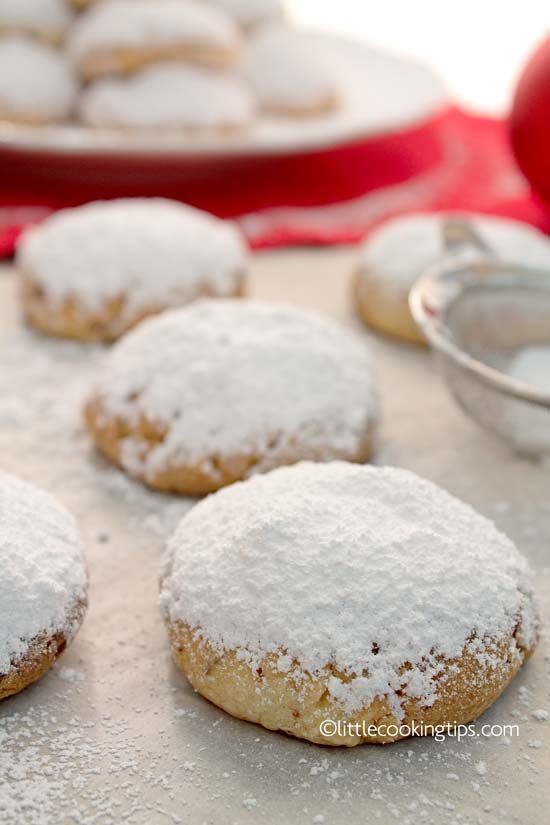
Calories (per serving): 206
Servings: 12+ slices/pieces
Preparation Time: 30 minutes
Cooking Time: 20 minutes
Up until the last couple of weeks the weather was very kind to us here in Greece; lots of sunshine and warm temperatures allowed for long walks and enjoying the scenery.
If the leaves hadn’t fallen off the trees, one may had the impression it was spring, not autumn! This changed a few days ago and it seems that the winter is finally here. The first snow has fallen up in the mountains, especially in the north, helping us get into the festive mood, which is appropriate for Christmas and the New Year celebration!
Of course, the winter was already here, providing us with lots of its yummy fruits and veggies. We especially enjoyed the quinces, made quince spoon sweet (you can read more about spoon sweets here) and cooked a wonderful ancient Greek recipe with roasted pork and quinces, which Panos learned from his grandfather (and he learned it from his own grandfather before). It’s a very old recipe and of course we’ll share it in the blog at some point.
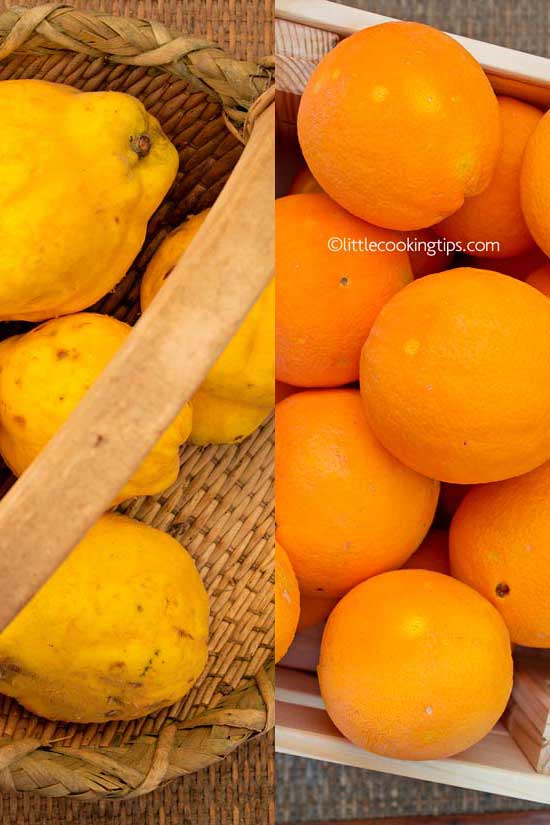 Fresh carrots are also amazing this time of year, and a very versatile ingredient. We used them in soups (especially fasolada bean soup), in coleslaw, made carrot cakes, and so on and so forth:)
Fresh carrots are also amazing this time of year, and a very versatile ingredient. We used them in soups (especially fasolada bean soup), in coleslaw, made carrot cakes, and so on and so forth:)
Another delicious sweet fruit you can enjoy this time of year is the persimmon. If you haven’t tried them before, you’re missing out. They usually have a mild aroma and are very juicy and sweet. They’re packed with vitamins and full of antioxidants. You should’ve seen us devouring those like we were kids, all smiling and making a mess.
 Do you remember the green oranges back in the summer? Check them out in the photo of this post! Ripe and sweet, this year’s oranges are perhaps the best in years. And for some strange reason the trees in Evia were very generous, we got much more than we can eat, turn into jams, preserves etc. So we started sharing them with friend, like an Orange Santa, passing by on a weekly basis.
Do you remember the green oranges back in the summer? Check them out in the photo of this post! Ripe and sweet, this year’s oranges are perhaps the best in years. And for some strange reason the trees in Evia were very generous, we got much more than we can eat, turn into jams, preserves etc. So we started sharing them with friend, like an Orange Santa, passing by on a weekly basis.
Speaking of Santa, we’re so excited the Christmas season is here! Greek Christmas food is delicious and full of memories of older times. Just like anywhere in the world where people celebrate this season, the food this time is special, is shared with family and friends and it’s this loving setting that sears those memories in our minds and makes them so unique.
The main ingredient of the season is pork. Back in the day people didn’t consume much meat, but they raised a pig which was slaughtered around Christmas and then shared in a large table with family and friends. Some of the parts were also used in sausages, while others were put in salt or were smoked, in order to preserve some of the meat for the next weeks. By the way if you’ve never tried Greek sausages, called Horiatiko Loukaniko, you must try them at least once!
Another popular recipe this time of year is chicken avgolemono (egg-lemon) soup. It’s a creamy delicious soup, usually including rice, which is served with lots of fresh ground pepper and artisan old-school bread. Even as we type those lines and remembered all about it, we’re drooling over the keyboard 🙂
 A big part of the Greek Christmas tradition is of course the sweet treats:melomakarona, kourabiedes and diples. Melomakarona and kourabiedes are the most popular ones, and if you’re in Greece around Christmas you’re bound to fall in love with them. You will find them in every household, any pastry shop, even in super markets and grocery stores. When you’re a guest, you know you’ll be treated a melomakarono (singular for melomakarona) or a kourabies (singular for kourabiedes). And even though you most certainly will have tasted many of them already, you will devour this treat with pleasure.
A big part of the Greek Christmas tradition is of course the sweet treats:melomakarona, kourabiedes and diples. Melomakarona and kourabiedes are the most popular ones, and if you’re in Greece around Christmas you’re bound to fall in love with them. You will find them in every household, any pastry shop, even in super markets and grocery stores. When you’re a guest, you know you’ll be treated a melomakarono (singular for melomakarona) or a kourabies (singular for kourabiedes). And even though you most certainly will have tasted many of them already, you will devour this treat with pleasure.
Melomakarona and kourabiedes are traditionally a made at home. When we were kids ourselves, singing carols, many neighbors were giving us kourabiedes or melomakarona as a holiday treat. Back at home of course, we also had our families’ versions.
They’re pronounced “koo-ra-bee-ye-thes”, and yes, it’s not that easy for a non-Greek speaking person to say the word! But, if you only say “kourab-yeh” to any Greek, he will know what you’re asking for, and give you the proper cookie. With a big smile on his/her face.
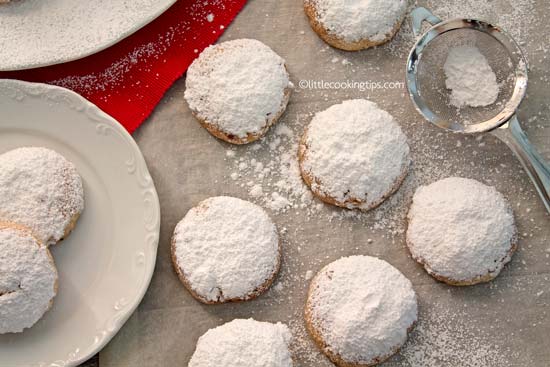 Those traditional, shortbread butter cookies include almonds, lots of powdered sugar, vanilla and usually rosewater or other flower water.
Those traditional, shortbread butter cookies include almonds, lots of powdered sugar, vanilla and usually rosewater or other flower water.
Edible rosewater (or flower water), adds an amazing scent to those cookies. But we know it may be difficult to find in some places (it’s available online though). If you do buy it, you will make traditional kourabiedes with exceptional aroma. If you’re thinking that it’s something you’ll buy once and then it’ll stay on your pantry gathering dust, that’s not the case.
There are many recipes which call for rosewater, plus you can try it in cookies, cakes and other desserts you already bake and create something different and delicious! Try substituting vanilla with flower water and you’ll get the idea:)
People who may not like the aroma of rosewater or flower water may also try adding bitter almond liqueur (Amaretto) which also makes for wonderful kourabiedes.
The main ingredient for kourabiedes is of course, butter. You want to use the best quality butter you can afford in this recipe. It will define the texture and taste of the cookies. The traditional way to make kourabiedes is with sheep’s or goat’s milk butter. The flavor is a bit intense for any non-Greek, plus it’s a bit hard to find abroad. That’s why we used regular cow’s butter in this recipe. Feel free to use any type of butter you prefer, or even mix of butters (like half sheep’s butter and half cow’s butter). If you can get the famous – in Greece -Corfu butter give it a try, it’s pure, excellent quality butter.
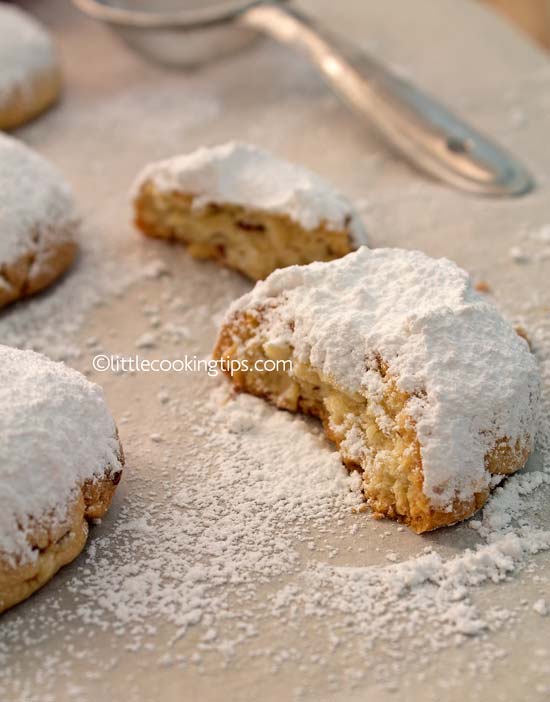 Regarding the shape of those cookies, some people may be confused due to the variety. There are 3 main shapes for kourabiedes: thick round cookies, crescents and balls. We think the easiest and nicest are the thick round cookies, as the shape helps in stacking up the cookies in layers, as they’re traditionally served.
Regarding the shape of those cookies, some people may be confused due to the variety. There are 3 main shapes for kourabiedes: thick round cookies, crescents and balls. We think the easiest and nicest are the thick round cookies, as the shape helps in stacking up the cookies in layers, as they’re traditionally served.
As for the size of the cookies, they may be large ones (about 40gr/1.5oz of dough per cookie), or smaller bite-size ones. The ones sold in pastry shops are usually bite-sized, and the homemade ones are usually larger.
So go ahead and give them a try! You won’t regret baking those, your home will be filled with the aroma of butter and rosewater, and you’ll enjoy dusting them with lots and lots of icing sugar. They’re both pretty and delicious! So follow the recipe below and make some festive Greek cookies!
Ingredients:
– 500gr / 17.5oz / 1.1 lb (4 cups) all purpose flour
– 250gr / 9oz butter (2 sticks and 1/4), softened (room temperature, see preparation)
– 150gr / 5.5oz (1 1/4 cups) powdered sugar
– 150gr / 5.5oz (about 1 cup) almonds, unsalted and toasted
– 1 egg yolk (use a large egg)
– 1 teaspoon baking powder, and more for dusting the cookies
– 2 teaspoons vanilla extract or vanilla powder
– edible rosewater or other flower water
Preparation:
Remove the butter from the fridge at least a couple of hours before using it. This will allow it to soften. Chopping it to pieces also helps.
 If using raw almonds, place them in a single layer on a lined baking sheet/pan and bake them for 10-15 minutes at 180C/350F (preheated oven) (pic. 1). Grind the toasted almonds in small pieces, using a food processor. Do not grind them into powder.
If using raw almonds, place them in a single layer on a lined baking sheet/pan and bake them for 10-15 minutes at 180C/350F (preheated oven) (pic. 1). Grind the toasted almonds in small pieces, using a food processor. Do not grind them into powder.
 Making the cookies:
Making the cookies:
In a large bowl, beat the butter (pic.2) for 8-10 minutes, using a stand mixer or an electric hand mixer on medium-high speed (until soft and fluffy, pic.3).
 Add the powdered sugar (pic.4) and beat for 10 more minutes until you get a “whipped cream” -like result (pic. 5).
Add the powdered sugar (pic.4) and beat for 10 more minutes until you get a “whipped cream” -like result (pic. 5).
 Add baking powder, vanilla (pic. 6) and mix with a rubber spatula. Add the egg yolk (pic. 7) and mix until it’s incorporated.
Add baking powder, vanilla (pic. 6) and mix with a rubber spatula. Add the egg yolk (pic. 7) and mix until it’s incorporated.
 Add 1 tablespoon of rosewater or flower water and mix (pic. 8). Start adding the flour (pic. 9), a couple of tablespoons at a time. Mix with the spatula each time you add some.
Add 1 tablespoon of rosewater or flower water and mix (pic. 8). Start adding the flour (pic. 9), a couple of tablespoons at a time. Mix with the spatula each time you add some.
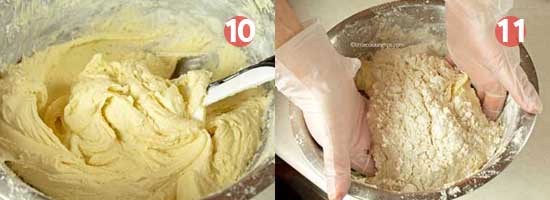 When you’ve added half the flour, you’ll get a fluffy, almost rubbery dough (pic. 10).
When you’ve added half the flour, you’ll get a fluffy, almost rubbery dough (pic. 10).
At this point add the rest of the flour at once, wear single-use gloves and start mixing with your hands (pic. 11). Do not overmix. Once the flour is incorporated,stop.
Important: USE the gloves in the recipe. It will help insulating the warmth of your hands (to avoid melting the butter as you mix).
 Add the ground almonds (pic. 12) and fold them into the dough. Shape the cookies (pic. 13). If using 40gr/1.5oz of dough per cookie, you’ll make about 25 cookies.
Add the ground almonds (pic. 12) and fold them into the dough. Shape the cookies (pic. 13). If using 40gr/1.5oz of dough per cookie, you’ll make about 25 cookies.
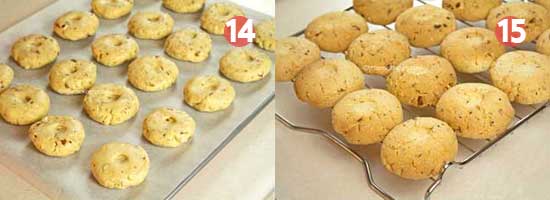 Place the cookies in a lined baking dish/pan (pic. 14) and bake for 15-18 minutes in the middle rack (use the oven fan in preheated oven). Remove from the oven,let them cool for 2-3 minutes, and then place them on a rack to dry out (pic. 15). Let them to cool completely.
Place the cookies in a lined baking dish/pan (pic. 14) and bake for 15-18 minutes in the middle rack (use the oven fan in preheated oven). Remove from the oven,let them cool for 2-3 minutes, and then place them on a rack to dry out (pic. 15). Let them to cool completely.
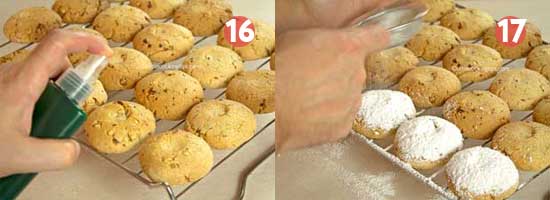 Spray them with rosewater or flower water (pic. 16) and dust them with powdered sugar (pic. 17). Be generous with both.
Spray them with rosewater or flower water (pic. 16) and dust them with powdered sugar (pic. 17). Be generous with both.
Your yummy treats are ready, place them in cookie box or a cake stand with a lid, in layers.
Kala Christougenna and Kali Chronia!
Tips:
1. You can use sheep, goat or cow butter or mix them. In any case, choose high quality butter for this recipe.
2. You can shape the kourabiedes in thick round cookies (like we did here), crescents or balls.
3. Leave a little space between the cookies before you bake them, as they will expand during baking.
4. If you want to make more cookies, feel free to double the ingredients above. The result is exactly the same.
5. If you don’t like rosewater or flower water (or can’t find any), add some vanilla powder in the icing sugar when you dust the cookies at the end of the recipe.
6. Always wear single-use gloves when you mix the dough and shape the cookies, to insulate the heat from your hands.
Try making these for Christmas or the New Year!
You can visit the Little Cooking Tips site by clicking on the name.


Wonderful post!
Both text and photos are seductive.
But many calories, seemingly.
So I have to ask you, M.L.: Is obesity common in Greece?
LikeLiked by 1 person
It is getting more common, as Greeks have taken to eating more junk food such as crisps, cookies and pizzas. In older times this kind of sweet was reserved for holidays, and people ate a Mediterranean diet of lots of vegetables and fruit, and not much meat. Now there is a trend towards more healthy eating, exercise etc. so hopefully the obesity factor will be contained. Also people have less disposable income to buy their kids junk.
LikeLike
Oh, there’s nothing like good Kourambiedes! I’ve posted a recipe for Melomakarona today. 🙂
LikeLiked by 1 person
I prefer Kourambiedes but the rest of the family all prefer melomakarona, so that’ll come in handy!
LikeLiked by 1 person
These look so yummy!
LikeLike
Try making some!
LikeLike
Lovely! Would love to make these delicious cookies! 🙂
LikeLiked by 1 person
Hi there, you had me at Kourambiedes…love them!
LikeLiked by 1 person
Hello Koukla-let me say. They are my favorite!!! My yiayia hid them from me and now I hide them from me! LOL Merry Christmas! Cheryl
LikeLiked by 1 person
I love exploring cuisines…thank you so much for the suggestion…love the look of these totally ☺☺
LikeLiked by 1 person
We just saw the post, thank you so much for featuring us on athensletters.com! We appreciate it!
Have a great New Year, full of health, joy and happiness!
Panos and Mirella
LikeLike
You’re welcome! Happy New Year to you too!
LikeLike
well done – tho am hiding my eyes from calories
LikeLiked by 1 person